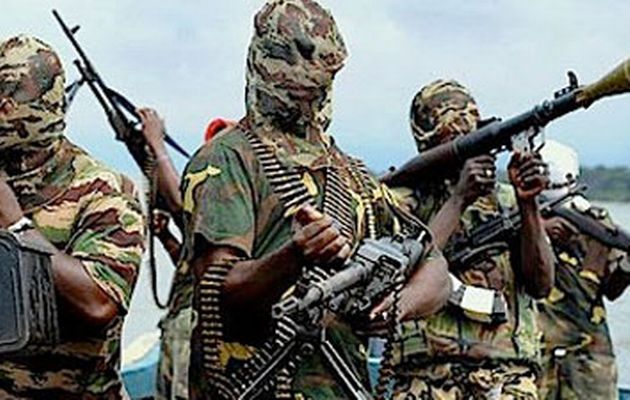TVC E. Eleven children under the age of six, including four babies, were among 149 people who have died this year following their detention in horrendous conditions in Giwa barracks detention centre in Maiduguri, Nigeria, Amnesty International has said.
Evidence gathered through interviews with former detainees and eyewitnesses, supported by video and photos, shows many detainees may have died from disease, hunger, dehydration, and gunshots wounds, it added.
The report titled “If you see it, you will cry: Life and death in Giwa barracks”, also contains satellite imagery which corroborates witness testimonies.
“The discovery that babies and young children have died in appalling conditions in military detention is both harrowing and horrifying. We have repeatedly sounded the alarm over the high death rate of detainees in Giwa barracks but these findings show that, for both adults and children, it remains a place of death,” said Netsanet Belay, Amnesty International’s research and advocacy director for Africa.
“There can be no excuses and no delay. The detention facilities in Giwa barracks must be immediately closed and all detainees released or transferred to civilian authorities. The government must urgently introduce systems to ensure the safety and well-being of children released from detention.”
Amnesty International believes that around 1,200 people are currently detained at Giwa barracks in overcrowded and unsanitary conditions. Many were arbitrarily rounded up during mass arrests, often with no evidence against them.
Once inside the barracks, they are incarcerated without access to the outside world or trial. At least 120 of those detained are children.
Detention and deaths of children
At least 12 children have died in Giwa barracks since February. Children under five years old, including babies, have been held in three overcrowded women’s cells.
In the last year there has been a ten-fold increase in the number of detainees in these cells rising from 25 in 2015 to 250 in early 2016. Unsanitary conditions mean that disease is rife.
Amnesty International understands that there were around 20 babies and children under five in each of the three cells.
One witness told Amnesty International that they saw the bodies of eight dead children including a five-month-old, two one-year-olds, a two-year-old, a three-year-old, a four-year-old and two five-year-olds.
Two former detainees reported that two boys and a girl, aged between one and two years old, died in February 2016.
One of the detainees, a 20-year-old woman, who had been held in a women’s cell for more than two months in 2016 told Amnesty International: “Three died while we were there. When the children died, the reaction was too much sadness.”
The other witness, a 40-year-old woman detained in Giwa barracks for more than four months, told Amnesty International that soldiers ignored pleas for medical attention: “Measles started when hot season started. In the morning, two or three [were ill], by the evening five babies [were ill]. You will see the fever, the [baby’s] body is very hot and they will cry day and night. The eyes were red and the skin will have some rashes. Later some medical personnel came and confirmed that this is measles.”
After the deaths of these children she says that more regular medical checks began. She told Amnesty International: “Every two days the medical personnel will come to the yard and say ‘bring out the children who are sick’. The doctor will see them at the door and give them medicine through the door.”
Despite these measures, it appears that children have continued to die. Between 22 and 25 April a one-year-old boy, a five-year-old boy and a five-year-old girl died.
Boys over five, arrested alone or with their parents, were held in a single cell. As with all detainees at the barracks, they were denied access to their families and held incommunicado.
Two boys who were detained in this cell told Amnesty International that they got no family visits and they were not allowed out of the cell except to be counted by soldiers.
One of the boys described how families arrested together were separated on arrival at Giwa. “Their father was in a cell and mother inside the women’s cell and the girls stayed with the mothers.”
Describing conditions of detention he told Amnesty International: “It is hunger and thirst and the heat – these are the main problems.” The other boy detained in the same cell confirmed: “The food was not enough. There was very little food.”
Mass public releases of detainees, including young children and babies, earlier this year, have demonstrated that the detention of children in Giwa barracks is no secret.
On 12 February 2016, at a release ceremony for 275 Giwa detainees who had been wrongly held on “suspicion of being involved in terrorist or insurgent activities,” Hassan Umaru, a major general, said among the 275 detainees released were “142 males, 49 females, 22 under aged, 50 children of cleared females.”
According to military statements, media reports and witness statements, the military has released at least 162 children since July 2015.
Detention and deaths of adults
At least 136 men have died in detention in Giwa in 2016, including 28 men who appeared to have gunshot wounds.
Photographic and video evidence of emaciated corpses of 11 men and the body of child under two years old has been forensically analysed by an independent expert.
A former detainee told Amnesty International: “In the morning they open the cell and take the urine and stool [buckets] outside. Next the coffin [corpses] will be taken outside.”
Bodies were brought to a mortuary in Maiduguri and from there Borno State Environmental Protection Agency (BOSEPA) personnel took them in rubbish trucks for burial in unmarked mass graves in the Gwange cemetery.
One witness told Amnesty International that since November 2015 a BOSEPA rubbish truck has visited the cemetery two or three times a week where staff bury the bodies separate from the public area of the cemetery.
Photos taken inside the cemetery show recently dug graves in the area visited by the BOSEPA workers. Satellite images taken on November 2015 and March 2016 show disturbed earth in this location.
Horrific detention conditions
According to witness testimony, conditions were worst in the men’s cells. One 38 year-old man who spent four months in Giwa in 2016 told Amnesty International that inmates received about half a litre of water per day.
“There is a small plastic bowl for food. People use it for small children. It is just that for each meal,” he said.
Another man, recently released after five months detention in the barracks, told Amnesty International: “There is no mat inside so you sleep on the floor. It is very congested. You can lie down, but only on your side and you cannot turn from one side to the other.”
Detainees have no washing facilities, their cells are rarely cleaned and disease is rife. Another former inmate told Amnesty International.
“No-one has a shirt so you can count the ribs of their body. There is no cleaning, so you live in disease. It is like a toilet. Me and my brother were sick inside the cell. Diarrhoea was common,” he said.
Despite steps taken to improve conditions in Giwa barracks in 2014 and 2015, with detainees receiving food three times a day, as well as blankets, sleeping mats and increased access to sanitary facilities and medical assistance, recent mass arrests appear to have erased some of these gains and death rates are on the increase.
“Faced with an enemy as brutal as Boko Haram a key challenge for the Nigerian military is to defeat them whilst still fully respecting human rights and the rule of law. This is a challenge that they seem to be failing,” said Netsanet Belay.
“Deaths of detainees in north-east Nigeria are nothing new. But as overcrowding increases so does the number of emaciated corpses emerging from Giwa barracks, with babies and young children among the dead.
“Almost a year after our findings revealed that huge numbers had died in detention, it is now time for President Buhari to uphold his pledge to launch an urgent investigation into these deaths, release the children and shut down Giwa barracks detention centre without delay.”
The cable
















